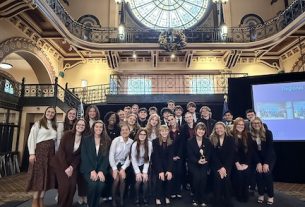by Nathaniel Morris / Staff Writer and Aubree Amback / Staff Writer
Zero sugar and diet sodas may seem like the healthier option when it comes to choosing what to drink, but that isn’t always the case.
The artificial sweeteners found in these beverages, such as sucralose, aspartame and acesulfame potassium, are known to cause health issues.
These issues can impact people short term by causing headaches and food cravings, and long term by causing dementia, kidney disease, heart disease and other health concerns. Even if a person drinks just one zero sugar soda a day.
A study done by the American Heart Association that assessed data from 200,000 people between the years 2006 and 2010 found that people who drank at least two liters of artificially sweetened sodas had a 20% higher risk of getting atrial fibrillation, or AFib.
AFib is a condition in which a person has an irregular or rapid heartbeat. It can increase your risk of stroke, heart failure, and blood clots.
In an article titled “Is diet soda a health choice?” from University Hospitals, naturopathic physician Dr. Jacob Wolf said, “Although diet soda doesn’t contain sugar, the artificial sweeteners, flavor enhancers and other chemical additives can be harmful to your health.”
Studies have shown that drinking diet soda can increase an individual’s risk for obesity because it heightens desire for high calorie foods. People who are overweight that switch to drinking diet soda rather than regular soda have appeared to eat more calories than when they drank regular soda.
If these drinks really are bad for us, why are they our only option in the school’s cafeteria and coffee shop?
“I think that it all stems from a school program that was put in place during Obama’s first term. You know how every First Lady has their own initiative that they do and that was Michelle Obama’s,” nutrition teacher Ashley Ralph said.
According to the National School Lunch Program, or the NSLP, established by the U.S. Department of Agriculture, all public schools cannot sell food or drinks that have added sugars that exceed ten calories by the year 2027. Since zero sugar and diet drinks do not have any added sugars and meet all requirements set by the NSLP, they are acceptable to sell in schools.
In order to keep high schoolers healthy, schools should be selling healthier drinks like low sugar fruit juice, and sparkling water instead of unhealthy zero sugar sodas and sports drinks.

